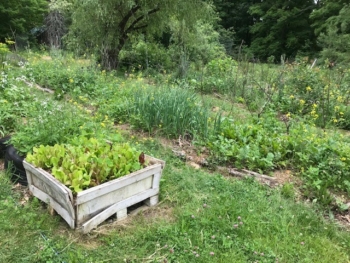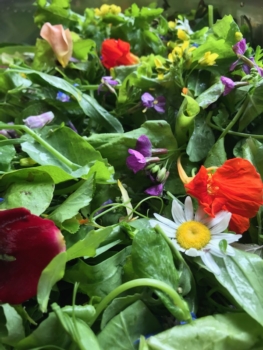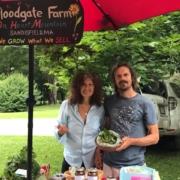Wild Roots: Diversified Cropping for Better Health
By Hernan Colmenero
West Coast to East Coast, Floodgate Farm knows nutrition. Having launched in Northern California, Bill Taylor and Jaye Moscariello moved their farm to Massachusetts to start anew after a devastating California wildfire. Salad University, their proprietary intensive farm and garden course, highlights the strong links between soil health, plant health, and human health through diversified cropping. And their outcome is a famous and nutritious salad mix with up to 63 different, and sometimes wild, ingredients.
Bill and Jaye practice the soil health principles of keeping the soil covered, minimizing soil disturbance, increasing biodiversity, and maintaining living plants a very innovative way. For example, when planting, say, swiss chard, instead of applying mulch in between plants, the entire planting bed is planted with a mix of carefully curated annual and perennial edible plants. This minimizes competition, supports growth, and provides protection from pests (Kuepper and Dodson, 2001). More information on companion planting can be found in the ATTRA publication Companion Planting & Botanical Pesticides: Concepts & Resources.

Planting bed. Photo: Floodgate Farm
As various scientists and doctors since Hippocrates have known, a diverse diet promotes human health. The dynamic duo certainly recognizes that optimum human health can be a direct result of a varied consumption of plants. Research shows that plants produce more polyphenols under stressful conditions as a coping mechanism to withstand harsh environments (Sharma et al., 2019). These polyphenols are compounds that help prevent cancers, cardiovascular diseases, diabetes, osteoporosis, and neurodegenerative diseases (Pandey and Rizvi, 2009). When Bill and Jaye harvest from their leafy green plant beds to create their signature salad mixes, the end product contains up to 63 different ingredients, a lot of them normally considered “wild.” These include lettuce, cress, and arugula, but also less common varieties of mint, oregano, marjoram, fennel leaves and buds, parsley leaves and buds, multiple varieties of sorrel, rose petals, hollyhock, daisy, society garlic, calendula, leek, onion flowers, and the list goes on and on.
All of this leads to a “beautiful jungle,” says Jaye. In addition to letting the ecosystem serve as an intricate biological pest control, the team prunes where necessary and uses organic treatments such as fish oil, neem oil, and herbal sprays. When a plant is not doing well, it is usually because it is planted too densely, or a plant nearby may be releasing allelopathic chemicals stunting its growth. Although diversified cropping contributes to more labor, Bill and Jaye welcome it because they can do more with less space and have bigger profit margins.

Salad mix. Photo: Floodgate Farm
To help their clients understand the links between soil, plant, and human health, they host Salad University, a three- to five-hour workshop focused on the principles of diversified plant management for soil health, harvesting from multi-species plant beds, and preparing and consuming the beautifully diverse salads. Participants learn that although there may be bigger margins from growing more cash crops in a smaller space, there are things to keep in mind in order to be successful. For example, fruiting crops may not be as big as those grown as row crops. Further, mechanizing the harvest is more difficult, if not impossible, and therefore, more labor-intensive. When others attempt to mimic their growing model, Bill and Jaye suggest planting less of one crop than they think they need because in the end, the density of plants can be too much in a given plant bed. They remind their Salad University audience of simple preparation techniques, such as tearing leafy greens instead of cutting, since that tends to shorten the lifespan of their peak flavor profile and nutrient content. Finally, they encourage their clients to dismiss fears of what we call weeds since they can be great sources of nutrition and biological controls in the farm.
These days, the word healing sometimes comes to mean the management of symptoms, not actually healing the root cause of disease. Bill and Jaye would like to see that changed, for their soil, the plants on their farm, the neighboring ecology, and their own wellbeing. You can listen to their Farm and Garden radio show at BerkshireRadio.org and use the Soil for Water Forum to pose questions and connect with other producers such as Bill and Shaye. With a concerted effort, we can minimize disease for ourselves and our environment.
For more information on Floodgate Farms, visit their pages.



